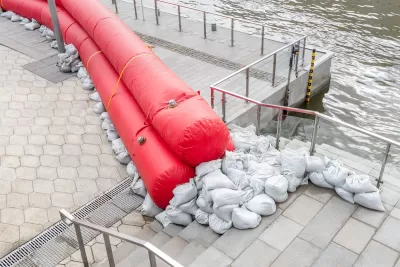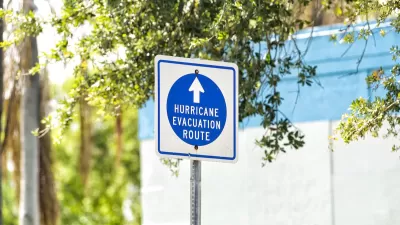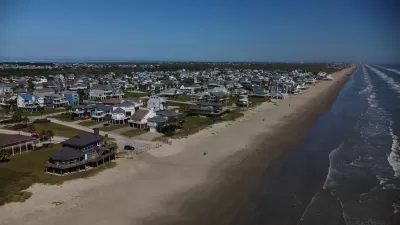New climate and flood models are needed to understand growing flood risks.

A ‘new normal’ of flooding and extreme weather events is prompting cities around the country to reevaluate their water infrastructure and flood risk models, writes Carl Smith in Governing. Smith notes that “floods are the most common and widespread weather-related disasters. Estimates of their annual cost range from $180 billion to $496 billion a year.”
Daniel Swain, a University of California, Los Angeles climate scientist, says “Virtually all of the infrastructure that we have built was built for a climate that no longer exists.” To address this, a new report from the US Water Alliance, Water Rising: Equitable Approaches to Urban Flooding, identifies priority areas for resilience and equity planning and encourages cities to assess their own local challenges and infrastructure.
In Hampton, Virginia, the Hampton Roads Sanitation District (HRSD) produced a report that highlights risks and resources in the region, offering local officials “an opportunity to look at exposure to climate hazards among the more than 150 facilities in the HRSD system and possible floodwater levels now and in the future.”
According to Swain, “Localities must gather and heed this kind of data as they plan for infrastructure improvements.” Mami Hara, CEO of the US Water Alliance, suggests a more regional approach to water infrastructure, such as a “regional resilience entity that brings together water and climate issues.”
FULL STORY: Planning for a Daunting New Normal of Flood Risk

Planetizen Federal Action Tracker
A weekly monitor of how Trump’s orders and actions are impacting planners and planning in America.

Maui's Vacation Rental Debate Turns Ugly
Verbal attacks, misinformation campaigns and fistfights plague a high-stakes debate to convert thousands of vacation rentals into long-term housing.

San Francisco Suspends Traffic Calming Amidst Record Deaths
Citing “a challenging fiscal landscape,” the city will cease the program on the heels of 42 traffic deaths, including 24 pedestrians.

Defunct Pittsburgh Power Plant to Become Residential Tower
A decommissioned steam heat plant will be redeveloped into almost 100 affordable housing units.

Trump Prompts Restructuring of Transportation Research Board in “Unprecedented Overreach”
The TRB has eliminated more than half of its committees including those focused on climate, equity, and cities.

Amtrak Rolls Out New Orleans to Alabama “Mardi Gras” Train
The new service will operate morning and evening departures between Mobile and New Orleans.
Urban Design for Planners 1: Software Tools
This six-course series explores essential urban design concepts using open source software and equips planners with the tools they need to participate fully in the urban design process.
Planning for Universal Design
Learn the tools for implementing Universal Design in planning regulations.
Heyer Gruel & Associates PA
JM Goldson LLC
Custer County Colorado
City of Camden Redevelopment Agency
City of Astoria
Transportation Research & Education Center (TREC) at Portland State University
Jefferson Parish Government
Camden Redevelopment Agency
City of Claremont





























